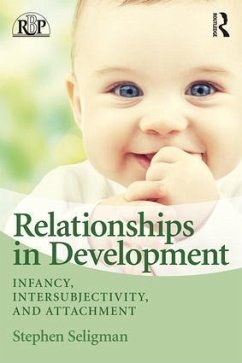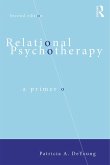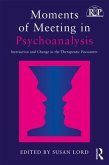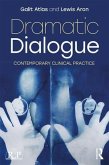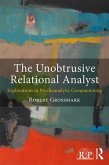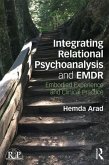Stephen Seligman (University of California, San Francisco, USA)
Relationships in Development
Infancy, Intersubjectivity, and Attachment
Stephen Seligman (University of California, San Francisco, USA)
Relationships in Development
Infancy, Intersubjectivity, and Attachment
- Broschiertes Buch
- Merkliste
- Auf die Merkliste
- Bewerten Bewerten
- Teilen
- Produkt teilen
- Produkterinnerung
- Produkterinnerung
The recent explosion of new research about infants, parental care, and infant-parent relationships has shown conclusively that human relationships are central motivators and organizers in development. Relationships in Development examines the practical implications for dynamic psychotherapy with both adults and children, especially following trauma.
Andere Kunden interessierten sich auch für
![Relational Psychotherapy Relational Psychotherapy]() Patricia A. DeYoungRelational Psychotherapy41,99 €
Patricia A. DeYoungRelational Psychotherapy41,99 €![Moments of Meeting in Psychoanalysis Moments of Meeting in Psychoanalysis]() Moments of Meeting in Psychoanalysis58,99 €
Moments of Meeting in Psychoanalysis58,99 €![Dramatic Dialogue Dramatic Dialogue]() Galit AtlasDramatic Dialogue42,99 €
Galit AtlasDramatic Dialogue42,99 €![The Unobtrusive Relational Analyst The Unobtrusive Relational Analyst]() Robert GrossmarkThe Unobtrusive Relational Analyst41,99 €
Robert GrossmarkThe Unobtrusive Relational Analyst41,99 €![Integrating Relational Psychoanalysis and EMDR Integrating Relational Psychoanalysis and EMDR]() Hemda AradIntegrating Relational Psychoanalysis and EMDR42,99 €
Hemda AradIntegrating Relational Psychoanalysis and EMDR42,99 €![Inhabiting Implication in Racial Oppression and in Relational Psychoanalysis Inhabiting Implication in Racial Oppression and in Relational Psychoanalysis]() Inhabiting Implication in Racial Oppression and in Relational Psychoanalysis27,99 €
Inhabiting Implication in Racial Oppression and in Relational Psychoanalysis27,99 €![The Discovery of the Self The Discovery of the Self]() Elizabeth SevernThe Discovery of the Self45,99 €
Elizabeth SevernThe Discovery of the Self45,99 €-
-
-
The recent explosion of new research about infants, parental care, and infant-parent relationships has shown conclusively that human relationships are central motivators and organizers in development. Relationships in Development examines the practical implications for dynamic psychotherapy with both adults and children, especially following trauma.
Hinweis: Dieser Artikel kann nur an eine deutsche Lieferadresse ausgeliefert werden.
Hinweis: Dieser Artikel kann nur an eine deutsche Lieferadresse ausgeliefert werden.
Produktdetails
- Produktdetails
- Relational Perspectives Book Series
- Verlag: Taylor & Francis Ltd
- Seitenzahl: 360
- Erscheinungstermin: 8. November 2017
- Englisch
- Abmessung: 234mm x 156mm x 19mm
- Gewicht: 524g
- ISBN-13: 9780415880022
- ISBN-10: 0415880025
- Artikelnr.: 40186051
- Herstellerkennzeichnung
- Libri GmbH
- Europaallee 1
- 36244 Bad Hersfeld
- gpsr@libri.de
- Relational Perspectives Book Series
- Verlag: Taylor & Francis Ltd
- Seitenzahl: 360
- Erscheinungstermin: 8. November 2017
- Englisch
- Abmessung: 234mm x 156mm x 19mm
- Gewicht: 524g
- ISBN-13: 9780415880022
- ISBN-10: 0415880025
- Artikelnr.: 40186051
- Herstellerkennzeichnung
- Libri GmbH
- Europaallee 1
- 36244 Bad Hersfeld
- gpsr@libri.de
Stephen Seligman is Clinical Professor of Psychiatry at the University of California, San Francisco; Joint Editor-in-Chief of Psychoanalytic Dialogues; Training and Supervising Analyst at the San Francisco Center for Psychoanalysis and Psychoanalytic Institute of Northern California; and Clinical Professor at the New York University Postdoctoral Program in Psychoanalysis. He is also co-editor of the American Psychiatric Press' Infant and Early Childhood Mental Health: Core Concepts and Clinical Practice.
What to Expect from This Book; Introduction: Why Developmental
Psychoanalysis? Part I: How We Got Here: A Roadmap to Psychoanalytic
Theories of Childhood and Development 1. Childhood Has Meaning of Its Own:
Freud and the Invention of Psychoanalysis 2. Theory I: Foreshadowings: Core
Themes and Controversies in the Early Freudian Theories 3. The Baby at the
Crossroads: The Structural Model, Ego Psychology, and Object Relations
Theories 4. Theory II: What Is a "Robust Developmental Perspective?" 5. The
Postwar Diversification and Pluralization of Psychoanalysis in the United
States: Interdisciplinary Expansion, the Widening Clinical Scope and the
New Developmentalism Part II: The Relational Baby: Intersubjectivity and
Infant Development 6. Infancy Research: Toward a Relational-Developmental
Psychoanalysis 7. Clinical Implications of Infancy Research: Affect,
Interaction and Non-Verbal Meaning in the Dyadic Field 8. Theory III: The
Relational Baby: Psychoanalytic Theory and Technique 9. Continuities from
Infancy to Adulthood: The Baby is Out of the Bathwater 10. Theory IV: The
Move to the Maternal: Gender, Sexualities, and the Oedipus Complex in Light
of Intersubjective Developmental Research Part III: Attachment and
Recognition in Clinical Process: Reflection, Regulation and Emotional
Security 11. Intersubjectivity Today: The Orientation and Concept 12.
Attachment Theory and Research in Context: Clinical Implications 13.
Recognition and Mentalization in Infancy and Psychotherapy: Convergences of
Attachment Theory and Psychoanalysis 14. Mentalization and Metaphor,
Acknowledgement and Grief: Forms of Transformation in the Reflective Space
15. Infant-Parent Interactions, Phantasies, and an "Internal Two-Person
Psychology": Projective Identification and the Intergenerational
Transmission of Early Trauma in Kleinian Theory and Intersubjective Infant
Research Part IV: Vitality, Activity, and Communication in Development and
Psychotherapy 16. Coming to Life in Time: Temporality, Early Deprivation,
and the Sense of a Lively Future 17. Forms of Vitality and Other
Integrations: Daniel Stern's Contribution to the Psychoanalytic Core Part
V: Awareness, Confusion and Uncertainty: Nonlinear Dynamics in Everyday
Practice 18. Feeling Puzzled While Paying Attention: The Analytic Mindset
as an Agent of Therapeutic Change 19. Dynamic Systems Theories as a Basic
Framework for Psychoanalysis: Change Processes in Development and
Therapeutic Action 20. Searching for Core Principles: Louis Sander's
Synthesis of Biological, Psychological, and Relational Factors and
Contemporary Developmental Psychodynamics
Psychoanalysis? Part I: How We Got Here: A Roadmap to Psychoanalytic
Theories of Childhood and Development 1. Childhood Has Meaning of Its Own:
Freud and the Invention of Psychoanalysis 2. Theory I: Foreshadowings: Core
Themes and Controversies in the Early Freudian Theories 3. The Baby at the
Crossroads: The Structural Model, Ego Psychology, and Object Relations
Theories 4. Theory II: What Is a "Robust Developmental Perspective?" 5. The
Postwar Diversification and Pluralization of Psychoanalysis in the United
States: Interdisciplinary Expansion, the Widening Clinical Scope and the
New Developmentalism Part II: The Relational Baby: Intersubjectivity and
Infant Development 6. Infancy Research: Toward a Relational-Developmental
Psychoanalysis 7. Clinical Implications of Infancy Research: Affect,
Interaction and Non-Verbal Meaning in the Dyadic Field 8. Theory III: The
Relational Baby: Psychoanalytic Theory and Technique 9. Continuities from
Infancy to Adulthood: The Baby is Out of the Bathwater 10. Theory IV: The
Move to the Maternal: Gender, Sexualities, and the Oedipus Complex in Light
of Intersubjective Developmental Research Part III: Attachment and
Recognition in Clinical Process: Reflection, Regulation and Emotional
Security 11. Intersubjectivity Today: The Orientation and Concept 12.
Attachment Theory and Research in Context: Clinical Implications 13.
Recognition and Mentalization in Infancy and Psychotherapy: Convergences of
Attachment Theory and Psychoanalysis 14. Mentalization and Metaphor,
Acknowledgement and Grief: Forms of Transformation in the Reflective Space
15. Infant-Parent Interactions, Phantasies, and an "Internal Two-Person
Psychology": Projective Identification and the Intergenerational
Transmission of Early Trauma in Kleinian Theory and Intersubjective Infant
Research Part IV: Vitality, Activity, and Communication in Development and
Psychotherapy 16. Coming to Life in Time: Temporality, Early Deprivation,
and the Sense of a Lively Future 17. Forms of Vitality and Other
Integrations: Daniel Stern's Contribution to the Psychoanalytic Core Part
V: Awareness, Confusion and Uncertainty: Nonlinear Dynamics in Everyday
Practice 18. Feeling Puzzled While Paying Attention: The Analytic Mindset
as an Agent of Therapeutic Change 19. Dynamic Systems Theories as a Basic
Framework for Psychoanalysis: Change Processes in Development and
Therapeutic Action 20. Searching for Core Principles: Louis Sander's
Synthesis of Biological, Psychological, and Relational Factors and
Contemporary Developmental Psychodynamics
What to Expect from This Book; Introduction: Why Developmental
Psychoanalysis? Part I: How We Got Here: A Roadmap to Psychoanalytic
Theories of Childhood and Development 1. Childhood Has Meaning of Its Own:
Freud and the Invention of Psychoanalysis 2. Theory I: Foreshadowings: Core
Themes and Controversies in the Early Freudian Theories 3. The Baby at the
Crossroads: The Structural Model, Ego Psychology, and Object Relations
Theories 4. Theory II: What Is a "Robust Developmental Perspective?" 5. The
Postwar Diversification and Pluralization of Psychoanalysis in the United
States: Interdisciplinary Expansion, the Widening Clinical Scope and the
New Developmentalism Part II: The Relational Baby: Intersubjectivity and
Infant Development 6. Infancy Research: Toward a Relational-Developmental
Psychoanalysis 7. Clinical Implications of Infancy Research: Affect,
Interaction and Non-Verbal Meaning in the Dyadic Field 8. Theory III: The
Relational Baby: Psychoanalytic Theory and Technique 9. Continuities from
Infancy to Adulthood: The Baby is Out of the Bathwater 10. Theory IV: The
Move to the Maternal: Gender, Sexualities, and the Oedipus Complex in Light
of Intersubjective Developmental Research Part III: Attachment and
Recognition in Clinical Process: Reflection, Regulation and Emotional
Security 11. Intersubjectivity Today: The Orientation and Concept 12.
Attachment Theory and Research in Context: Clinical Implications 13.
Recognition and Mentalization in Infancy and Psychotherapy: Convergences of
Attachment Theory and Psychoanalysis 14. Mentalization and Metaphor,
Acknowledgement and Grief: Forms of Transformation in the Reflective Space
15. Infant-Parent Interactions, Phantasies, and an "Internal Two-Person
Psychology": Projective Identification and the Intergenerational
Transmission of Early Trauma in Kleinian Theory and Intersubjective Infant
Research Part IV: Vitality, Activity, and Communication in Development and
Psychotherapy 16. Coming to Life in Time: Temporality, Early Deprivation,
and the Sense of a Lively Future 17. Forms of Vitality and Other
Integrations: Daniel Stern's Contribution to the Psychoanalytic Core Part
V: Awareness, Confusion and Uncertainty: Nonlinear Dynamics in Everyday
Practice 18. Feeling Puzzled While Paying Attention: The Analytic Mindset
as an Agent of Therapeutic Change 19. Dynamic Systems Theories as a Basic
Framework for Psychoanalysis: Change Processes in Development and
Therapeutic Action 20. Searching for Core Principles: Louis Sander's
Synthesis of Biological, Psychological, and Relational Factors and
Contemporary Developmental Psychodynamics
Psychoanalysis? Part I: How We Got Here: A Roadmap to Psychoanalytic
Theories of Childhood and Development 1. Childhood Has Meaning of Its Own:
Freud and the Invention of Psychoanalysis 2. Theory I: Foreshadowings: Core
Themes and Controversies in the Early Freudian Theories 3. The Baby at the
Crossroads: The Structural Model, Ego Psychology, and Object Relations
Theories 4. Theory II: What Is a "Robust Developmental Perspective?" 5. The
Postwar Diversification and Pluralization of Psychoanalysis in the United
States: Interdisciplinary Expansion, the Widening Clinical Scope and the
New Developmentalism Part II: The Relational Baby: Intersubjectivity and
Infant Development 6. Infancy Research: Toward a Relational-Developmental
Psychoanalysis 7. Clinical Implications of Infancy Research: Affect,
Interaction and Non-Verbal Meaning in the Dyadic Field 8. Theory III: The
Relational Baby: Psychoanalytic Theory and Technique 9. Continuities from
Infancy to Adulthood: The Baby is Out of the Bathwater 10. Theory IV: The
Move to the Maternal: Gender, Sexualities, and the Oedipus Complex in Light
of Intersubjective Developmental Research Part III: Attachment and
Recognition in Clinical Process: Reflection, Regulation and Emotional
Security 11. Intersubjectivity Today: The Orientation and Concept 12.
Attachment Theory and Research in Context: Clinical Implications 13.
Recognition and Mentalization in Infancy and Psychotherapy: Convergences of
Attachment Theory and Psychoanalysis 14. Mentalization and Metaphor,
Acknowledgement and Grief: Forms of Transformation in the Reflective Space
15. Infant-Parent Interactions, Phantasies, and an "Internal Two-Person
Psychology": Projective Identification and the Intergenerational
Transmission of Early Trauma in Kleinian Theory and Intersubjective Infant
Research Part IV: Vitality, Activity, and Communication in Development and
Psychotherapy 16. Coming to Life in Time: Temporality, Early Deprivation,
and the Sense of a Lively Future 17. Forms of Vitality and Other
Integrations: Daniel Stern's Contribution to the Psychoanalytic Core Part
V: Awareness, Confusion and Uncertainty: Nonlinear Dynamics in Everyday
Practice 18. Feeling Puzzled While Paying Attention: The Analytic Mindset
as an Agent of Therapeutic Change 19. Dynamic Systems Theories as a Basic
Framework for Psychoanalysis: Change Processes in Development and
Therapeutic Action 20. Searching for Core Principles: Louis Sander's
Synthesis of Biological, Psychological, and Relational Factors and
Contemporary Developmental Psychodynamics

